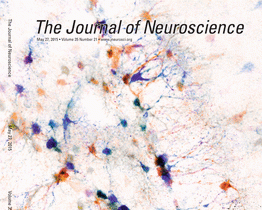 The Journal of Neuroscience is retracting a 2012 paper on how estrogen produced in the brain shapes the auditory system on the basis of “a report from Northwestern University that describes substantial data misrepresentation” in the paper.
The Journal of Neuroscience is retracting a 2012 paper on how estrogen produced in the brain shapes the auditory system on the basis of “a report from Northwestern University that describes substantial data misrepresentation” in the paper.
The paper, “Mechanistic Basis and Functional Roles of Long-Term Plasticity in Auditory Neurons Induced by a Brain-Generated Estrogen,” is, according to PubMed, the last one published by its last (and corresponding) author Raphael Pinaud, and first author Liisa Tremere, who were both at Northwestern University at the time. Before his position at Northwestern, Pinaud held positions at the University of Oklahoma and the University of Rochester.
Pinaud and Tremere jointly published a handful of papers on the role of estrogen in the auditory system of the brain starting in 2009, some of which are co-authored by two of the other researchers on the current paper, which has been cited 8 times, according to Thomson Scientific’s Web of Knowledge.
Here’s the retraction notice:
The Journal of Neuroscience has received a report from Northwestern University that describes substantial data misrepresentation in the article “Mechanistic Basis and Functional Roles of Long-Term Plasticity in Auditory Neurons Induced by a Brain-Generated Estrogen” by Liisa A. Tremere, Ryan F. Kovaleski, Kalping Burrows, Jin Kwon Jeong, and Raphael Pinaud, which appeared on pages 16478–16495 of the November 14, 2012 issue. Because the results cannot be considered reliable, J Neurosci is retracting the paper.
The Society for Neuroscience, which publishes the Journal of Neuroscience, declined to comment on the retraction:
The Society for Neuroscience does not comment on specific retractions in the Journal of Neuroscience. You may want to review this statement on the reporting of scientific research, and guidelines posted on the SfN website regarding scientific communication.
We’ve questioned the Journal of Neuroscience’s approach to retractions before.
Northwestern didn’t add much, either, in responding to our request for comment:
Northwestern University received concerns regarding research conducted in Raphael Pinaud’s lab which included research reported in the Tremere et al article, “Mechanistic Basis and Functional Roles of Long-Term Plasticity in Auditory Neurons Induced by a Brain-Generated Estrogen” in the Journal of Neuroscience. The University’s Office for Research Integrity facilitated a thorough investigation into the concerns. The investigation determined that results cited in the article cannot be considered reliable. Therefore, Northwestern requested that the Journal of Neuroscience publish a retraction of the article, which occurred this week. The University’s investigation report is confidential. Raphael Pinaud and Liisa Tremere are no longer employed by Northwestern University. They left the University in 2013.
When we asked whether the university’s report also flagged other papers by these researchers and whether additional retractions are expected, Northwestern declined to comment further.
Last March, the biomedical research industry blog DrugMonkey reported that Pinaud was listed as the Editor in Chief of the Journal of Experimental Neuroscience with the title of “Associate Professor in the Department of Neurobiology at Northwestern University,” but that his name was absent from Northwestern’s online department listing. (Shortly thereafter, Pinaud’s name was removed from that journal’s website.) After poking around in RePORTER, DrugMonkey also noted that a grant of Pinaud’s at Northwestern, which was supposed to run until July 2015, appeared to have ended more than two years early.
We haven’t been able to find contact info for Pinaud and Tremere, but we’ve reached out to the other three authors on the Journal of Neuroscience paper – Ryan Kovaleski (Northwestern), Kaiping Burrows (University of Oklahoma) and Jin Kwon Jeong (Yale University) – and will circle back with anything we learn.
Like Retraction Watch? Consider supporting our growth. You can also follow us on Twitter, like us on Facebook, add us to your RSS reader, and sign up on our homepage for an email every time there’s a new post.
I guess the papers were not really “sound”, ho ho ho.
Drug Monkey has a nice write up on the events associated with this retraction.
http://drugmonkey.scientopia.org/2015/05/27/aha-it-was-about-data-faking-after-all/